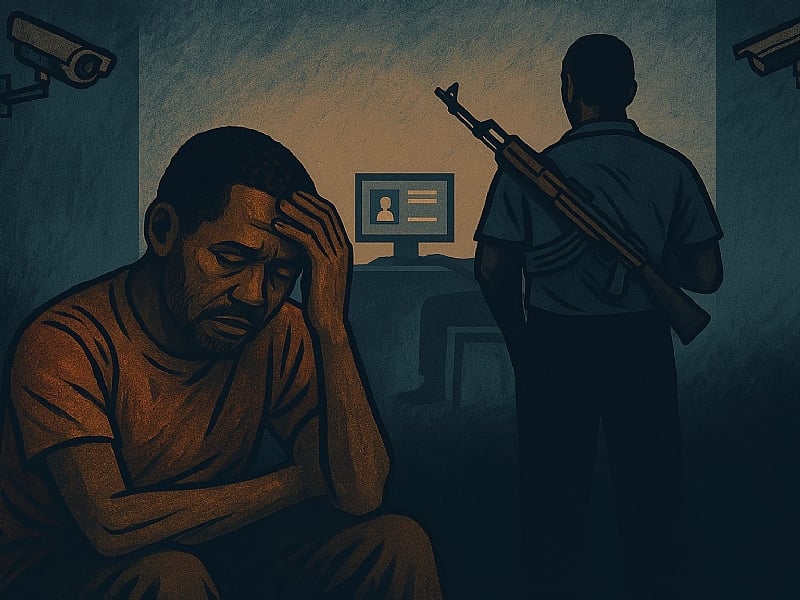Samuel’s story began with the noble ambition of supporting his family after his father’s passing. Armed with a diploma in computer science and a modest income from an insurance company in Accra, Ghana, he yearned for financial stability to provide for his seven dependents. A friend’s proposition of a data-entry job in Thailand, offering a significantly higher salary, seemed like the answer to his prayers. Samuel invested everything he owned into this opportunity, fueled by dreams of a brighter future. However, this dream quickly morphed into a harrowing nightmare. Upon arrival in Thailand, he and his friend were met with suspicious circumstances – unusual processing, clandestine communication, and a mysteriously long journey to a supposed warehouse far from Bangkok. Their eight-hour drive culminated at a remote riverbank, where armed men forced them across the border into Myanmar. This marked their entry into a scam compound known as “the park,” a hub of forced criminality.
Inside the heavily guarded compound, Samuel and countless others, predominantly from Africa, were coerced into perpetrating online scams. They were assigned daily targets of $30,000, forced to engage in fraudulent cryptocurrency investments and product schemes, working under the constant threat of violence and electrocution. Their passports were confiscated, their movements monitored, and their communication restricted. Samuel’s world shrank to the confines of this oppressive environment, where he toiled for 16 hours a day, haunted by worry for his family and the constant fear of retribution. He witnessed firsthand the brutal treatment meted out to those who failed to meet their targets or dared to resist. The psychological torture intensified when his friend was beaten as a warning against further defiance. This act of cruelty pushed Samuel to the brink but also ignited a spark of resistance. With the support of other Ghanaians, they confronted their captors, securing his friend’s release, albeit into the hands of another, even more brutal, company. This highlighted the grim reality of their situation: they were treated as commodities, bought and sold like slaves.
A faint flicker of hope emerged when news of potential rescue operations reached the compound. However, this hope was intertwined with fear, as the captors spread disinformation, claiming that rescuers intended to imprison or deport them, even threatening damaging media exposure. While some succumbed to these threats, others, including Samuel and another Ghanaian named Kobi, resolved to risk everything for freedom. They chose to place their trust in the potential for legitimate rescue rather than remain under the thumb of their criminal overlords. Even after leaving the compound with rescue officials, the shadow of their captors lingered. Their movements and communications remained under surveillance, highlighting the far-reaching influence of these criminal networks.
True relief finally arrived when they reached the Ghanaian Embassy and contacted the International Organization for Migration (IOM). This marked the beginning of their journey back to safety and the start of their recovery. The IOM, in collaboration with the Royal Thai Government and other partners, provided crucial support, including pre-departure counselling and logistical assistance, facilitating their eventual return to Ghana. In April 2025, Samuel, Kobi, and twelve other survivors were welcomed back to Ghana by the Ghanaian Ambassador and the IOM at the Tak Immigration Checkpoint. While their physical ordeal had ended, the emotional and psychological scars remained, emphasizing the long road to recovery that lay ahead.
Samuel and Kobi’s story underscores the urgent need for greater awareness and proactive measures to combat this pervasive form of modern slavery. Their experiences shed light on the sophisticated and brutal tactics employed by these criminal networks, preying on vulnerable individuals seeking better opportunities. Their accounts highlight the importance of international cooperation and the vital role of organizations like the IOM in providing essential support to victims of trafficking. The sheer scale of the problem, with an estimated 120,000 people trapped in Myanmar’s scam hubs and another 100,000 in Cambodia, underscores the global nature of this crisis and the urgent need for concerted efforts to dismantle these criminal enterprises.
The return of Samuel, Kobi, and other survivors represents not only a personal triumph but also a testament to the power of resilience and the importance of coordinated efforts in combating human trafficking. While their ordeal has left an indelible mark, their determination to rebuild their lives and their commitment to raising awareness offer a beacon of hope. They are determined to transform their traumatic experience into a catalyst for change, advocating for greater awareness and proactive measures to prevent others from falling prey to these insidious scams. Their voices serve as a powerful reminder of the human cost of trafficking and the urgent need for a global response to this modern form of slavery.


